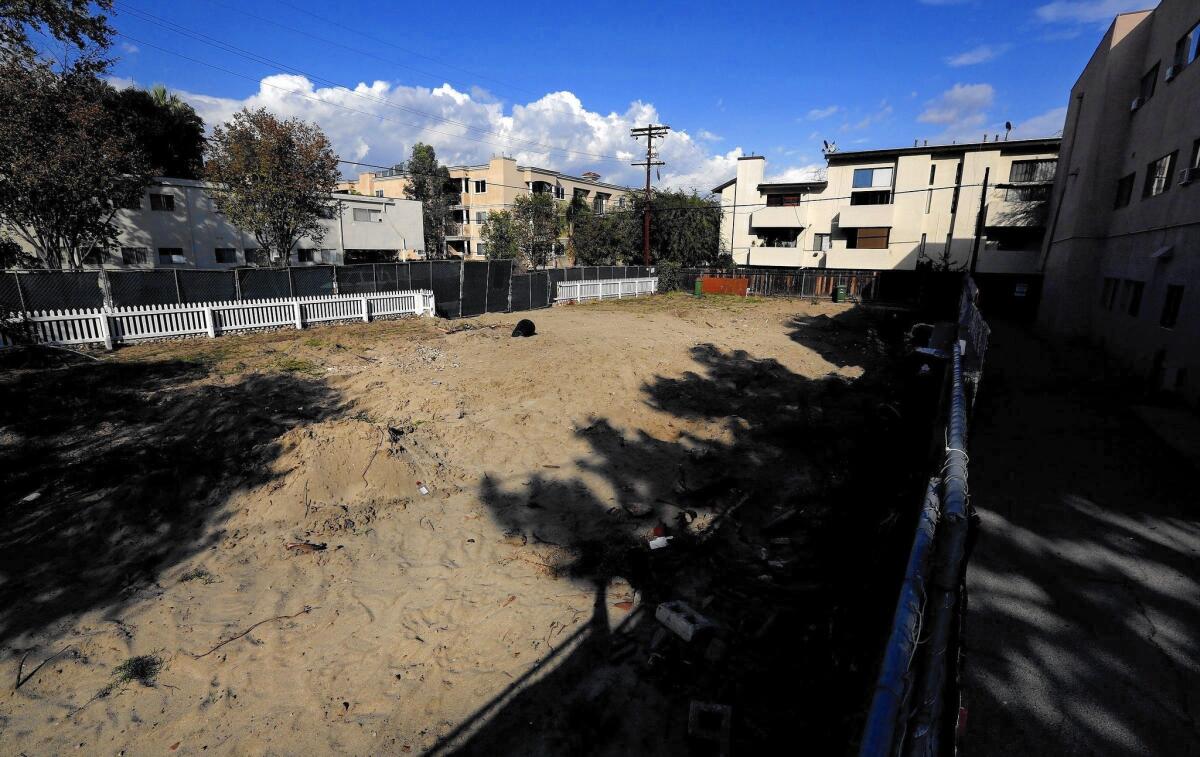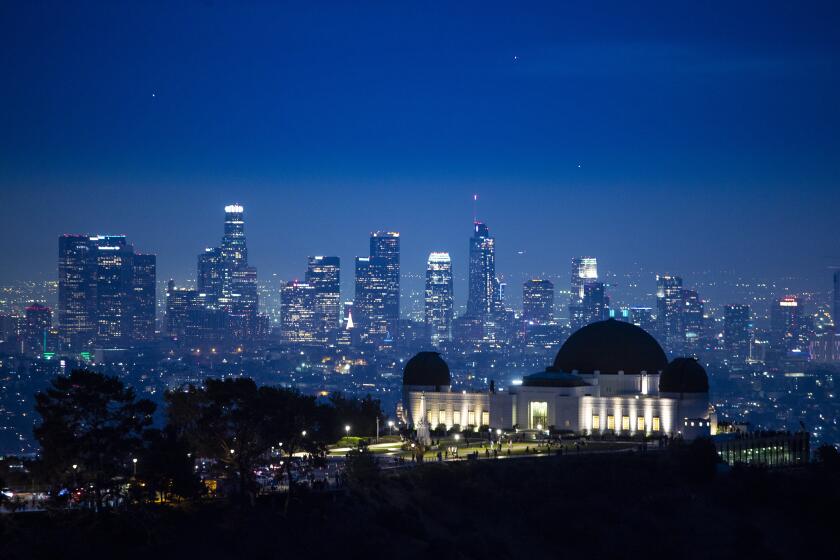Lawsuit seeks to block a condo project where Marilyn Monroe once lived

- Share via
Los Angeles is facing a lawsuit over the demolition of a San Fernando Valley house that Marilyn Monroe once lived in, filed by residents who argue that the city trampled state and local laws when the City Council gave the green light for new condos to be built there.
But the court battle goes beyond the legacy of the blond bombshell. The suit accuses the City Council of illegally agreeing to routinely back any development project supported by the council member who represents a given area, including the condo project that led to razing the Valley Village home.
It says the practice of automatically heeding the wishes of the relevant council member is evidenced by how often the council votes unanimously. And it says the alleged agreement flouts state laws that ban trading votes and require decisions to be made publicly.
“If your hands are bound by a behind-the-scenes voting agreement, then obviously you’re not deliberating in public,” said Richard MacNaughton, one of two attorneys representing an unincorporated association of Los Angeles County residents called Save Valley Village.
City officials did not respond Monday to the allegations raised in the lawsuit. A spokesman for City Atty. Mike Feuer said that his staff was reviewing the complaint and could not comment further at this time. Councilman Paul Krekorian, who represents the Valley Village area, also declined to comment.
And Vanessa Rodriguez, a spokeswoman for Council President Herb Wesson, said she had not seen the details of the lawsuit, but suggested that it was not troubling for council members to listen to the lawmaker who represented the area of a new project. In general, “the locally elected representative is the best equipped individual to provide their City Council colleagues with guidance” on issues in their district, Rodriguez said.
The council voted unanimously last month to allow developer Joe Salem to move ahead with plans for a five-unit condominium building on the site of the demolished home. Save Valley Village is seeking to reverse city approval of the project, revoke its permits and stop it from getting any more approvals.
The group’s lawsuit, filed last week, comes on the heels of several courtroom defeats for the city that have invalidated its development decisions, including rulings that halted construction on a half-finished Target on Sunset Boulevard and rolled back approval for a Hollywood high-rise that was already occupied by tenants.
The house at the heart of the latest dispute was torn down days before a Cultural Heritage Commission hearing on whether to consider making the silver screen star’s onetime home a historic monument. Monroe lived in the back unit at the Hermitage Avenue property with her in-laws while her first husband, Jim Dougherty, was serving overseas.
Building department officials said the demolition permit had been obtained before the historic monument application was filed. Even if the house had remained intact, city staffers did not recommend considering the house as a possible monument, arguing that Monroe didn’t break into the film industry until years later.
Monroe “only resided at the property for one year and did not live in the unit during the productive period of her career,” a report by city planning officials said.
Save Valley Village counters that the home captured the essence of her life at a crucial stage. “While Norma Jean was born at County Hospital in Lincoln Heights, Marilyn Monroe’s career was born while living in this house,” the lawsuit argues.
The group also contends that the city had “overwhelming evidence” that it should have prepared an environmental impact report on the planned condos. That report would have considered possible alternatives to tearing down the Hermitage Avenue building, such as relocating it elsewhere, MacNaughton said.
The lawsuit also argues that Salem illegally demolished the home because the proper notices and inspections had not been done and that city officials knew it — or should have known.
Salem could not be reached for comment Monday morning at one of his companies. In an email responding to The Times, his attorney, Alicia Bartley, said the structures were torn down with a valid demolition permit and that “all approvals were issued in accordance with applicable laws.”
“We are confident that all of the petitioners’ claims will be defeated,” Bartley wrote.
The condo project also survived earlier challenges at the South Valley Area Planning Commission and a City Council committee, which voted to deny an appeal against the project.
Besides pressing to stop the condo project, Save Valley Village also wants the city to nullify any development projects that received unanimous approval in the last year, which it says occurs “over 99% of the time.”
Save Valley Village isn’t the first group to point out how frequently the council votes in unison: Five years ago, the Center for Governmental Studies found that votes had been unanimous 99.993% of the time during seven months of the previous year. Though most council members were “ideologically in sync,” the report also said that “the cost of opposing fellow council members is high,” citing “council insiders” who said that “members face retribution for casting votes against the projects of other council members.”
Bob Stern, who was president of the now-disbanded center when it released that report, said he didn’t think there was anything illegal about the practice — but called it “an unfortunate tradition.”
“I think everybody should be looking at every project to see if it’s good for the city,” Stern said.
Then again, he joked, that wouldn’t make him a very popular councilman.
Twittter: @LATimesEmily
ALSO:
Metro receives average rating in statewide evaluation of rail transit stations
Californians’ love of class-action lawsuits to be tested by Supreme Court
Farmworkers find a bumper crop of squalor in Coachella Valley trailer parks
More to Read
Sign up for Essential California
The most important California stories and recommendations in your inbox every morning.
You may occasionally receive promotional content from the Los Angeles Times.











